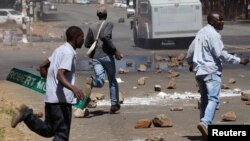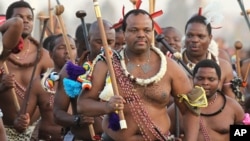Southern African governments are backsliding on human rights, as nations repeatedly violate basic rights and defy their own constitutions, Human Rights Watch says.
The situation is being thrown into sharp relief as Swaziland, the continent's last absolute monarchy, takes over this week as chair of the Southern African Development Community.
Southern African leaders are expected to focus on development, trade, and political reforms in member countries as they meet at the two-day SADC summit in the mountainous kingdom.
But rights violations are grabbing headlines around the region, most recently in Zimbabwe, where protests have escalated against the increasingly autocratic government of President Robert Mugabe, and police hit back by beating, gassing and arresting demonstrators.
Human Rights Watch says they estimate that at least 74 people have been arrested in the aftermath of a protest last week that police dispersed, even though demonstrators had a court order allowing their march.
Serious discussion needed
Human Rights Watch Senior Africa Researcher Dewa Mavhinga says Zimbabwe should be at the top of the agenda as leaders meet.
“Unfortunately, it does not seem that SADC leaders appreciate the seriousness of the situation in Zimbabwe, because they appear not to be looking or to be seeing what is happening,” he said during a briefing in Johannesburg.
"This is why we are raising this matter for the attention of SADC leaders to say, ‘You cannot behave like the ostrich and bury your head in the sand when Zimbabwe is burning.’ There is need to quickly deploy human rights monitors so at least you know for yourself what is happening independently and you take appropriate action or corrective measures, before it’s too late.”
Zimbabwe’s government-backed Herald newspaper blithely reported on the president’s departure from Harare and arrival in Mbabane (Swaziland) in detail, without mentioning the protests, the arrests or the controversy around his 35-year rule.
Critics say Mugabe has destroyed the once-promising economy, rigged elections, and trampled on human rights.
Absolute ruler
But Human Rights Watch's Mavhinga says SADC’s new leader is unlikely to challenge an entrenched leader. For the next year, the organization will be headed by Africa’s last absolute autocrat.
Swaziland's 48-year-old King Mswati III has numerous wives, cars and jets. He has described his nation’s unique government, in which opposition political parties are banned and the government has been accused of suppressing dissidents, as “a marriage between the monarch and the ballot box.”
“It is not the right sort of message that should be coming from SADC leaders to have Swaziland as chair,” Mavhinga said. “But one hopes that perhaps it would be an opportunity for Swaziland, in terms of the spotlight being on Swaziland for the next 12 months, to highlight the abuses that are taking place in that kingdom.”


